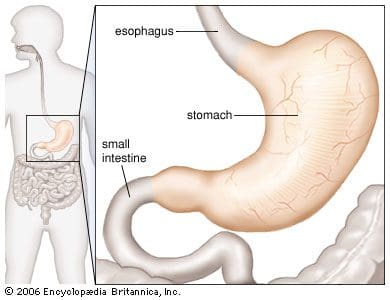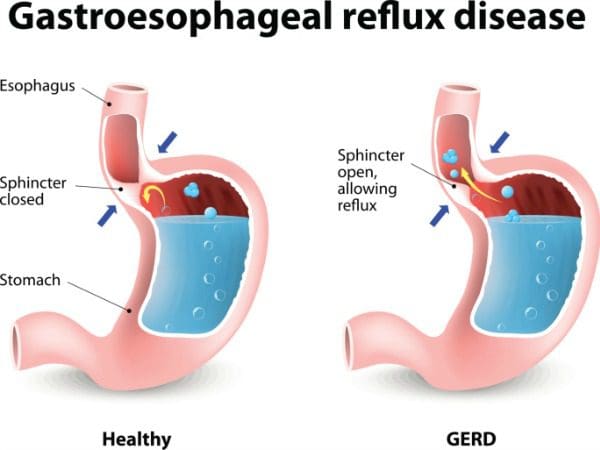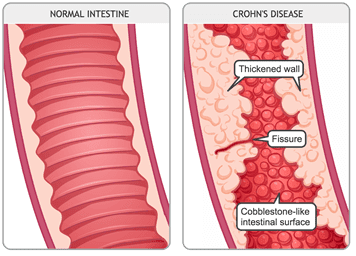Do you feel:
- Excessive belching, burping or bloating
- A sense of fullness during and after meals
- Gas immediately after a meal
- Offensive breath
- Difficulty digesting proteins and meats
The Stomach
The human stomach’s core function is to aid food to digest when an individual eats. The four critical components of the gastric digestive function are:
- A reservoir capacity
- Acid secretion
- Enzyme secretion
- Gastrointestinal motility
GERD
GERD or gastroesophageal reflux disease when the contents from the stomach move up into the esophagus, causing acid reflux. Researchers at the NIDDK (National Institute of Diabetes and Digestive and Kidney Diseases) stated that about 20% of individuals are affected by GERD, if it is left untreated, it can sometimes cause serious complications.One of the main symptoms that GERD causes is heartburn. Heartburn is a discomfort feeling that is felt from behind the breastbone as a burning sensation. It tends to get worse on a person if they lay down, bend over, after eating food. Not all individuals with GERD experiences heartburn, there are other possible symptoms such as:
- Chest pains
- Difficulty swallowing
- Bad breath
- The sensation of a lump in the throat
- Sour taste in the mouth
- Respiratory problems
- Tooth decay
Gallstones
Gallstones are hardened deposits of digestive fluids that can form in the gallbladder. The gallbladder is a small, pear-shaped organ that's located on the right side of the abdomen, just beneath the liver. It also holds bile fluid that releases into the small intestines. Gallstones can range in sizes from as small as sand to as large as a golf ball. According to Harvard Health Publications, about 80% of gallstones are made of cholesterol, while the other 20% is made up of calcium salts and bilirubin.Gallstones can lead to pain in the upper right abdomen. An individual may start to feel gallbladder pains when they eat foods that are high in fat, especially fried foods. Furthermore, if the pain continues, it may lead to an inflamed gallbladder or cholecystitis. They may also experience symptoms like:
- Pain on the right-hand side of the body, just below the ribs
- Back pain between the shoulder blades
- Pain in the right shoulder
- Nausea
- Dark urine
- Clay-colored stool
- Stomach pain
Crohn’s Disease
Crohn’s disease is an inflammatory disease. It causes inflammation in the body's digestive tract and can cause several chronic illnesses. Inflammation caused by Crohn's disease can be in different areas of the digestive tract in different people. The inflammation often spreads deep into the layers of the affected bowel tissue, causing pain, and sometimes lead to life-threating complications.Crohn’s disease symptoms can vary depending on which part of the gut is affected in the body. Specific symptoms can often develop gradually and become worse over time, and it is rare for the symptoms of Crohn's disease to develop suddenly and dramatically. The symptoms of Crohn's disease include:
- Pain
- Ulcers in the gut
- Mouth ulcers
- Diarrhea
- A fever
- Fatigue
- Loss of appetite
- Rectal bleeding and anal fissures
- Anemia
Conclusion
The stomach's primary function is to digest the food that a person consumes. Four components help aid the stomach to function correctly. When the stomach is dealing with chronic illnesses like Crohn's disease, gallstones, and GERD, it can lead to inflammation on the intestinal barriers. When it is left untreated, it can lead to life long complicated problems in the body. Some products can help aid the stomach digestion as they help support the gastrointestinal system as well.October is Chiropractic Health Month. To learn more about it, check out Governor Abbott’s bill on our website to get full details on this historic moment.
The scope of our information is limited to chiropractic, musculoskeletal and nervous health issues as well as functional medicine articles, topics, and discussions. We use functional health protocols to treat injuries or chronic disorders of the musculoskeletal system. To further discuss the subject matter above, please feel free to ask Dr. Alex Jimenez or contact us at 915-850-0900 .
References:
AAAS, EurekAlert. “A Bulging Midriff Roughly Doubles Women's Chances of Gallstone Surgery.” EurekAlert!, 13 Feb. 2006, www.eurekalert.org/pub_releases/2006-02/bsj-abm021006.php.Brazier, Yvette. “Cholecystitis: Symptoms, Causes, Diagnosis, and Treatment.” Medical News Today, MediLexicon International, 22 Jan. 2018, www.medicalnewstoday.com/articles/172067.php.
Brazier, Yvette. “Crohn's Disease: Symptoms, Diet, Treatment, and Causes.” Medical News Today, MediLexicon International, 11 Jan. 2019, www.medicalnewstoday.com/articles/151620.php.
Editorial Team, Healthline, and Heather Cruickshank. “Everything You Need to Know About Acid Reflux and GERD.” Healthline, 7 Dec. 2018, www.healthline.com/health/gerd.
Holland, Kimberly. “Understanding Crohn's Disease.” Healthline, 2 May, 2019, www.healthline.com/health/crohns-disease.
MacGill, Markus. “GERD: Symptoms, Causes, and Treatment.” Medical News Today, MediLexicon International, 18 Jan. 2018, www.medicalnewstoday.com/articles/14085.php.
Macon, Brindles Lee, et al. “Understanding Gallstones: Types, Pain, and More.” Healthline, 1 June, 2017, www.healthline.com/health/gallstones.
O'Connor, Anthony, and Colm O'Moráin. “Digestive Function of the Stomach.” Digestive Diseases (Basel, Switzerland), U.S. National Library of Medicine, 2014, www.ncbi.nlm.nih.gov/pubmed/24732181.
Publishing, Harvard Health. “What to Do about Gallstones.” Harvard Health, 2011, www.health.harvard.edu/womens-health/what-to-do-about-gallstones.
Staff, Mayo Clinic. “Crohn's Disease.” Mayo Clinic, Mayo Foundation for Medical Education and Research, 13 Sept. 2019, www.mayoclinic.org/diseases-conditions/crohns-disease/symptoms-causes/syc-20353304.
Staff, Mayo Clinic. “Gallstones.” Mayo Clinic, Mayo Foundation for Medical Education and Research, 8 Aug. 2019, www.mayoclinic.org/diseases-conditions/gallstones/symptoms-causes/syc-20354214.
Unknown, Unknown. “Definition & Facts for GER & GERD.” National Institute of Diabetes and Digestive and Kidney Diseases, U.S. Department of Health and Human Services, 1 Nov. 2014, www.niddk.nih.gov/health-information/digestive-diseases/acid-reflux-ger-gerd-adults/definition-facts.








